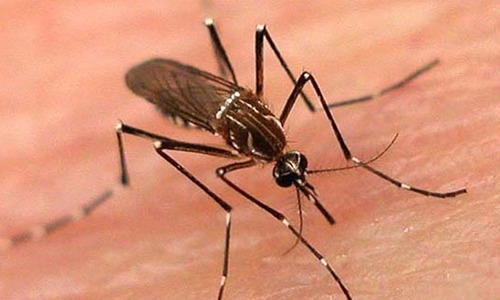PESHAWAR: The experts suggested biological method to reduce population of mosquitoes as 150 more people were affected by dengue virus in Khyber Pakhtunkhwa on Tuesday.
The new method has successfully been used in many countries for reduction in mosquitoes’ population and applying brakes on the vector-born ailment on durable basis.
“The new method has successfully been implemented by Brazil and Singapore through Wolbachia-infected mosquitoes. Both the countries have significantly reduced the population of mosquitoes biologically,” said Dr Asif Ali, the director of Institute of Pathology and Diagnostic Medicine at Khyber Medical University.
Dr Asif was part of the five-member team that visited WHO Collaborating Centre for Dengue Management in Singapore in 2018 following outbreak of dengue in 2017 that killed more than 70 people and infected more than 100,000. He said that not only dengue virus but other vector-borne diseases like yellow fever, zika virus and chikungunya could be also prevented biologically.
150 more cases reported in KP
The visiting team also included officials of World Health Organisation (WHO), entomologists, clinicians and laboratory scientists. They got a week-long training in Singapore.
“Not only we saw scientific evidence about decrease in reproduction of mosquitoes and they also gave us assurance of their cooperation in putting the method into practice in the province,” said Dr Asif. He said that it was the only way to get rid of dengue virus. Otherwise, the virus would continue to appear every year and kill and infect people, he added.
Another member of the same team said that government had to follow the method for permanent solution to dengue.
“Our public health system is reactionary and not preventive. We need the later, which doesn’t cost too much while a lot of money is spent on curative side,” he said. He added that anti-mosquito spray was no solution as it polluted water and vegetables and entailed harmful impact on human health.
The expert said that every year spray was conducted in the affected areas but without any long-term results. “When we carry out spray outside a building, mosquitoes go inside or leave the place but remain alive. Dengue virus dies in over 40 Celsius and below 10 and vanishes in winter or severe heat but appears every year in ideal temperature,” he added.
Dengue fever has so far killed nine people and infected 9,492 others in Khyber Pakhtunkhwa. It is affecting each age group from small children to adults.
“The vicious cycle will continue so we need the new method to reduce their population,” he said. He said that spray and hygiene were tried but with limited success. He added that long-term effective solution was biological control through Wolbachia-infected mosquitoes.
The expert said that insecticides could still be used for a quick knock down once the population of a mosquito was already high, but the biological Wolbachia approach started early in the season could serve to keep the population low, prevent a population explosion, or may even eliminate a population of mosquito.
“Wolbachia are natural bacteria present in up to 60 per cent of insect species including some mosquitoes. However, Wolbachia are not usually found in the Aedes aegypti mosquito, the primary species responsible for transmitting human viruses such as Zika, dengue, chikungunya and yellow fever,” he said.
The expert said that the programme could be started in Peshawar that was home to more than 50 per cent of infected people. “People are unlikely to stay safe against mosquito-bites due to power shutdowns. People also store water, which is source of the mosquito breeding,” he added.
Published in Dawn, November 17th, 2021















































